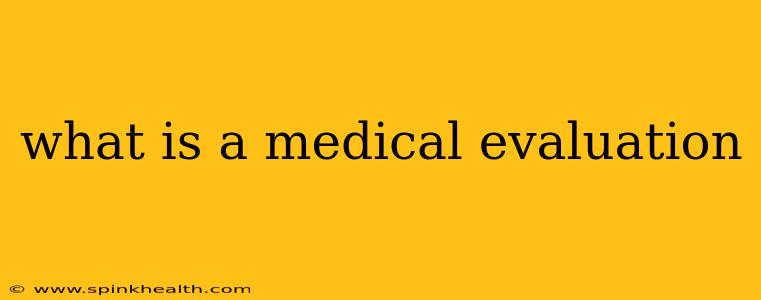What is a Medical Evaluation? Unpacking the Process of Understanding Your Health
Imagine you're a detective investigating a mystery. The clues are scattered – a persistent cough, unexplained fatigue, a nagging pain. To solve this health mystery, you need a thorough investigation, and that's precisely what a medical evaluation provides. It's not just a quick check-up; it's a comprehensive assessment of your overall health, designed to identify potential problems and guide you towards the best path to wellness.
This investigative process involves several key elements, creating a holistic picture of your well-being. Let's delve into the details:
What does a medical evaluation typically involve?
A medical evaluation is a personalized journey, tailored to your specific concerns and health history. However, several common components usually form the core of the process:
-
Detailed History Taking: This is the detective work phase. Your doctor will ask detailed questions about your medical history, family history, lifestyle (diet, exercise, smoking, alcohol consumption), current symptoms, and any medications you're taking. This information provides crucial context for understanding your current state.
-
Physical Examination: This involves a hands-on assessment of your body. Your doctor will check your vital signs (blood pressure, heart rate, temperature, respiratory rate), listen to your heart and lungs, examine your skin, and assess your reflexes. This physical examination provides objective data to complement the subjective information gathered during the history taking.
-
Diagnostic Tests (if necessary): Sometimes, the initial history and physical exam aren't enough to reach a diagnosis. In these cases, your doctor may order further investigations, such as blood tests, urine tests, imaging scans (X-rays, CT scans, MRIs), or other specialized tests, depending on your specific situation.
What is the purpose of a medical evaluation?
The primary purpose of a medical evaluation is to determine your overall health status. It helps:
-
Identify potential health problems: Early detection is key to managing many health conditions effectively. A medical evaluation can detect problems even before you experience noticeable symptoms.
-
Diagnose existing illnesses: If you're experiencing symptoms, the evaluation helps your doctor pinpoint the cause and determine the appropriate treatment.
-
Develop a personalized treatment plan: Based on the evaluation's findings, your doctor can create a customized plan addressing your specific needs, incorporating medication, lifestyle changes, or referrals to specialists.
-
Monitor chronic conditions: For individuals with ongoing health issues, regular medical evaluations are crucial for monitoring disease progression, adjusting treatment, and preventing complications.
-
Promote preventive care: Medical evaluations are essential for preventative care, including vaccinations, screenings (e.g., mammograms, colonoscopies), and lifestyle counseling to prevent future health problems.
What are the different types of medical evaluations?
The type of evaluation needed depends greatly on the individual's circumstances. Here are a few examples:
-
Routine Check-up: A general assessment of your health, often including preventative measures.
-
Symptom-Focused Evaluation: This targets a specific health concern you're experiencing, such as a persistent cough or unexplained weight loss.
-
Pre-operative Evaluation: Before undergoing surgery, a thorough evaluation is done to ensure you're healthy enough for the procedure.
-
Specialized Evaluations: These focus on specific organ systems or conditions (e.g., a cardiology evaluation for heart problems).
How long does a medical evaluation take?
The duration of a medical evaluation varies depending on its purpose and complexity. A routine check-up might take 30-45 minutes, while a more comprehensive evaluation, including diagnostic tests, could take several hours or even days.
Is a medical evaluation the same as a physical exam?
While a physical examination is a component of a medical evaluation, the evaluation is a broader concept. The evaluation encompasses the physical exam, along with the medical history, diagnostic tests (if needed), and the development of a treatment plan or recommendations for your health.
In essence, a medical evaluation is a crucial step towards understanding and improving your health. It’s a partnership between you and your healthcare provider, working together to navigate your health journey. Remember, open communication and actively participating in the process are key to achieving the best possible outcomes.

